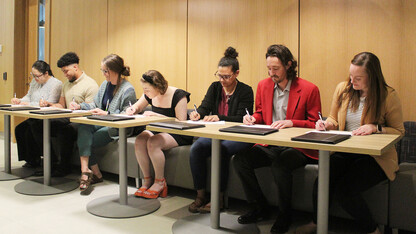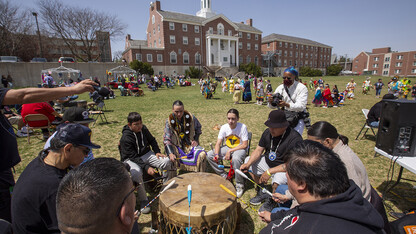· 6 min read
Potter to present lecture, recital on Bach’s 6th Cello Suite on Viola

Clark Potter, professor of viola in the Glenn Korff School of Music, will present a faculty lecture-recital on Johann Sebastian Bach’s 6th Cello Suite on Viola on Feb. 18.
“Playing Bach’s 6th Cello Suite on Viola: Fighting Through the Muck to Reach the Prize” will begin at 7:30 p.m. The event is free and will be available via livestream, with no in-person audience.
Potter will perform his own edition of the suite on a five-string viola. The instrument was provided to the university through a gift from the Constance Miriam Syford and Ethel Corrine Syford Memorial Fund, which supports faculty research. The performance will be the first time the instrument will be heard in public.
Potter said he hopes audiences will be entertained.
“I want people to understand the process of what I’ve done,” he said. “And I hope that everyone will find it interesting, not just the viola players or musicians. Hopefully there will be enough in there for everybody.”
Bach’s six Cello Suites are some of the most frequently performed and recognizable solo compositions ever written for cello.
“The six Cello Suites have become a staple of the viola repertoire,” Potter said. “Bach wrote six big pieces for solo violin and six big pieces for solo cello, and nothing similar for the viola. The Cello Suites work a little better on viola because the cello and the viola are tuned more similarly than the viola and the violin.”
Unlike Bach’s solo violin sonatas, no autographed manuscript survives for the Cello Suites.
“The basic root of all evil in this case is that we don’t have an autographed manuscript of these pieces in Bach’s handwriting,” Potter said. “We have the pieces from a few early sources, the most important of which, to me, is the version that was done by Bach’s second wife, Anna Magdalena Bach. We have a version of it in her handwriting. As a result, every cello player and every viola player and every cello teacher and every viola teacher have decided that they could do better. While I don’t necessarily think I could do better, I think I came up with a version of the suite that respects the original but works out a few of the problems.”
Potter likes his edition.
“And by just going through the process, I’ve learned so much, and I think my students are the real beneficiaries,” he said.
In addition, while five of the suites are written for a four-stringed instrument, the sixth suite was written for an instrument with five strings.
“Cellos, violas and violins have four strings,” Potter said. “We don’t even know exactly which instrument he intended the piece to be written for, but it was written for a five-stringed instrument. Therefore, any time anybody wants to play it on a four-string instrument, because of the way he wrote the piece, it doesn’t work as well as it would for the five-string.”
Thus, for this edition, Potter will use the five-string viola purchased with the grant.
“My edition, what I lovingly refer to as the Potter Edition of the Bach Suites, has only included the first five suites for years and years,” he said. “I was fortunate enough to get a grant which enabled the university to purchase for me a five-string viola so that I and my students, and students well beyond my time here, will be able to check out this instrument and try the 6th Suite more or less as Bach intended it. Obviously, it’s still originally written for a bass instrument of some kind, and a viola is a mid-range instrument. Nonetheless, I think it works really well.”
Potter said the issue is that the piece goes too high for a viola player to play with any amount of comfort.
“So any time people play the piece with the four-stringed instrument, they have to make adjustments to the music and bring notes lower into a playable range for short periods of time,” Potter said.
Playing the five-stringed viola, however, proved to be more challenging for Potter when he first received the instrument last June.
“The day the viola arrived, I was very excited to try it. My wife said, ‘OK, see you in a few hours,’ when I retreated into what has become my home office, but I was out of there in 45 minutes,” Potter said. “I was frustrated, heartbroken, disappointed — how hard it is for this old dog to learn the new trick of playing a five-string. The realization hit me that this was going to be a lot of work, which is exactly what it’s been and really continues to be.”
The neck of the instrument is wider to accommodate five strings.
“The strings are closer together, which doesn’t help me, because now I have to play more on the fingertips than on the pads of my fingers, which is how I normally play,” Potter said.
His students have also tried playing it, though with much faster results.
“They all took to it much more easily than I did,” Potter said. “I think this hearkens back to the old dog, new tricks thing. It also gives me hope that when I put a five-string in their hands, it won’t be as awful an experience for them as it was for me initially. Fortunately, I’m enjoying playing it much more now.”
Potter said he is glad he went through this process.
“I think everyone ought to go through the process because of how it forces us to look at this music afresh,” Potter said. “Realize that I had been playing the first five suites basically one way for decades. And taking on the idea of making my own edition of the suites forced me to look at everything as if brand new, to make new decisions and not merely accept the decisions that have been made by people who have gone before me. And I have gained a new appreciation for this music.”
He hopes audiences tune in for the livestream.
“I know there are some things that are missed by not hearing the piece in person, but hopefully, and especially with the lecture, I can get them to listen for things that they might not otherwise hear,” Potter said. “When I perform this music, it will be the first live performance of it on a five-string I have ever heard. But it won’t be the last.”







